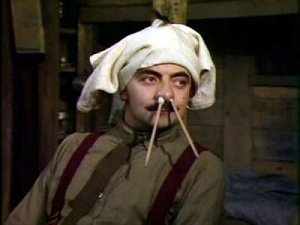
Famous writers are often remembered not just for their work, but also for unusual, outrageous, peculiar and just plain weird conditions in which they created them, their daily routines, strange preferences and idiosyncrasies. May years after their deaths these writing habits continue to fascinate us, perhaps attracting even more interest than their writings.
Jack Kerouac tended to collect notes for his books for years and then explode into a rampage of unstoppable typing. In order to maintain constant tempo and eliminate interruptions necessary for reloading the typewriter, he taped pages into one enormously long scroll and was greatly annoyed when editors asked him to cut it up.
John Steinbeck, probably afraid to run out of writing supplies in the midst of inspiration, always kept exactly twelve carefully sharpened pencils at his workplace, in case all of them suddenly break and he has to sharpen them while his latest brilliant idea fades away.
These habits, however, are somewhat explainable – there is some kind of logic behind them. Other writers were much more extravagant.
Truman Capote, for example, was wildly superstitious. He never began or finished a piece of work on Friday, demanded his hotel room to be changed if there was a 13 in its telephone number and never put more than three cigarette butts into a single ashtray, hiding the rest in his pockets.
Friedrich Schiller was known to deliberately keep a pile of rotting apples in one of the drawers of his desk, declaring that this stench served as an inspiration and he could neither live nor write without constantly breathing it in.
Virginia Woolf worked at a peculiar self-designed standing desk and wrote in inks of different and rather unorthodox colors, ranging from purple to green, as did Lewis Carrol. Ernest Hemingway was also partial to typing while standing up – although in his case it was probably yet another way to motivate himself to end writing by afternoon and get drunk by three.
Some habits, however, although weird when described, were perfectly reasonable from that particular writer’s standpoint. James Joyce always wrote lying on his stomach in a white suit, either with a large blue pencil or with crayons on cardboard. This is always described as an example of pretentious whims writers and other creative people often indulge in, but in fact, it was purely pragmatic decision, as Joyce was almost completely blind, and this manner of writing allowed him to actually see what he was writing. White suit served as an additional light reflector, in case you wonder.
Nevertheless, one should of course always remember that these personal quirks, albeit interesting to read about, probably weren’t all exactly real. Both writers themselves and those who report their unusual habits to general public are highly prone to exaggerations. The reason is simple – it is a yet another way to make the writer more interesting, to attract attention to him. A writer who can only write with left hand while jumping on a pogo stick is sure to attract more attention than somebody who just sits and writes – even if the writing itself leaves much to be desired.